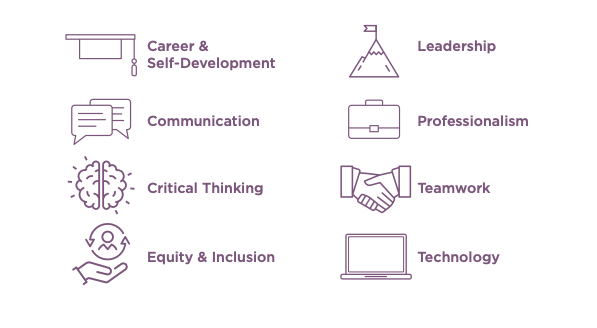The term “Soft skills” is a term of many names.
People skills, core skills, essential skills, power skills —
The way we describe essential professional skills is a difficult term to nail down.
In this blog, we will explore the etymology of the phrase, its different uses and meanings, and explore perspectives on the term.
Some may not know that the term soft skills owes its origin to the U.S. military. The term was likely coined in the late 1960’s, and its original meaning was simple — skills that do not relate to operating technical machinery.
Since that time, the phrase has evolved into a much broader context and is used across industries to refer to a wide range of transferable professional skills. The term soft skills refers to abilities like critical thinking, emotional intelligence, communication, teamwork, adaptability, time management and more.
These skills are crucial to today’s professional landscape. In fact, they are some of the most sought-after skills by employers.
Seattle Corporate Search reports:
“93% of employers say soft skills play a critical role in their decision about whom they want to hire,” Ian Siegel, co-founder and CEO of ZipRecruiter, said in the company’s recent report The Job Market Outlook for Grads.”
Further, Forbes reports that “84% of employees and managers believe new employees must possess soft skills and demonstrate them in the hiring process” or it may signal future poor performance.
If these competencies are at the forefront of employers’ wish-lists, are they downplayed, in name and discourse?
Experts at Chief argue so, while adding that the term soft skills may have a somewhat gendered history as well.
Being that this term relates to non-technical skills, and that non-technical positions were most accessible to women at the time the term was coined, some say that the term even downplays women’s contributions and competencies in the workplace.
Inclusivity Consultant Minette Norman expands on this interesting take: “The narrative around soft skills must change. Call them strong skills, brave skills, or leadership superpowers…”
Leadership Strategist Dan Pontefract argues that it’s long past time to change the name of such essential skills. He suggests calling them professional skills, as these competencies often point to one’s lifelong success professionally.
More on his perspective here:
“I believe it is imperative that we (finally) retire the term "soft skills" and replace it with "professional skills" (or at least "leadership skills") to accurately reflect the true importance and impact of these abilities in today's organizations.”
His full op-ed can be found here.
At Suitable, we understand the weight that these skills hold. This was one of our main reasons for partnering with long-time career readiness researchers at NACE to integrate these competencies into our student success frameworks.
NACE focuses on eight specific career readiness competencies that have been rigorously researched as essential skills for success in the professional world.

All but one of these essential skills are directly related to non-technical professional competencies.
Particularly as trends move toward competency-based hiring, these core skills are a gold mine for tomorrow’s employers and employees alike.
With the understanding that “soft” skills make up the cornerstone of what today’s employers seek, is it time to call them a term that holds more weight?
Many experts note that these skills encourage teamwork and vulnerability in the workplace – a synergy that would make most teams run more smoothly. Further, some consider these competencies to be life skills that would increase efficacy in any role.
Whether we opt to change the nomenclature around this term or not, it’s worth considering how crucial these people-focused and adaptable skill sets are, particularly in today’s professional landscape.
For college students, one of the best ways to differentiate themselves as they enter the employment pool is to demonstrate these transferrable career readiness competencies.
In fact, some reports show that up to 75% of employers feel that their new grad hires lack the soft skills needed to succeed, as reported by Inside Higher Ed.
This is why we are committed to helping students develop these skills through various co-curricular and experiential learning activities. When paired with our validated NACE Competency Assessment Tool, students receive direct feedback on where exactly they stand in their proficiency of the skill and where they need to improve in order to be ready for the workforce.
We are proud to partner with NACE on this endeavor, and we will continue to support our university partners in engaging students in these areas – to boost ROI, improve career outcomes, and give today’s grads the tools they need to succeed.
Overall, people skills, essential skills, power skills – whatever name suits you – will always be valuable in workplaces that require collaboration.
It’s time we invest resources into soft skill development among tomorrow’s leaders, making career readiness the forefront of higher education through intentional co-curricular and experiential learning programs.
Setting students up for success in a competency-based hiring market means placing our focus on the skills that employers say matter: the first step is acknowledging the importance of these lifelong skills.
Sources:
93% of employers want to see soft skills on your resume-here are 8 of the most in-demand ones. Seattle Corporate Search. (n.d.). https://www.seattlecorporatesearch.com/blog/news/recruiting/93-of-employers-want-to-see-soft-skills-on-your-resumehere-are-8-of-the-most-in-demand-ones
Galloway, L. (2022, November 7). Stop calling them soft: Why today’s essential skills are anything but. Chief. https://chief.com/articles/soft-skills-at-work
Hora, M. T. (n.d.). Career-readiness initiatives are missing the mark (opinion). Inside Higher Ed | Higher Education News, Events and Jobs. https://www.insidehighered.com/views/2023/01/11/career-readiness-initiatives-are-missing-mark-opinion#:~:text=A%20drumbeat%20of%20reports%20finds,a%20hot%20topic%20for%20higher
Pontefract, D. (2023, March 28). It’s about time we abandoned the term’ soft skills’. Forbes. https://www.forbes.com/sites/danpontefract/2023/03/27/its-about-time-we-abandoned-the-term-soft-skills/
Writer, M. C. (2021, September 10). Soft skills: Origin, where it comes from and concept. Medium. https://content-paradigm360.medium.com/soft-skills-origin-where-it-comes-from-and-concept-33a078426898


